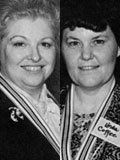

- Roe v. Wade full program
- Sarah Weddington
- Justice Blackmun oral history
- Justice Ginsburg on the Economics of Roe v. Wade
- Justice Scalia on Originalism and Abortion
- Conflicting Views: Senators Hatch and Boxer on Roe v. Wade
- Jane Roe
- Book Discussion on Generation Roe
- Planned Parenthood v. Casey Oral Argument
- CBS Evening News Report on Roe v. Wade Decision
Roe v. Wade (1973) determined that a woman’s right to have an abortion is protected under the Fourteenth Amendment right to privacy established by the previous Supreme Court case Connecticut v. Griswold. The Court ruled, however, that this right is not absolute; states can restrict an abortion based on the viability of the fetus.
“Jane Roe,” the plaintiff in this case, was a pseudonym for Norma McCorvey, a Texas woman who discovered she was pregnant in 1969. Texas law at the time outlawed abortion except in rare cases. Two Texas lawyers looking to challenge the statute helped McCorvey sue Dallas County District Attorney Henry Wade in a test case that they hoped would legalize abortion. In a 7-2 decision, Justice Blackmun wrote that a woman’s right to an abortion is part of her right to personal privacy, a right the Court found in the Fourteenth Amendment’s protection of personal liberty. The ruling tied the legality of abortion to the medical realities of pregnancy. It legalized abortion in the first trimester but allowed states to regulate it starting in the second trimester and to outlaw it when the fetus becomes viable. Norma McCorvey has since undergone a religious conversion and now opposes abortion, which remains a controversial topic of both public opinion and the law.

Norma McCorvey is a Texas woman who was known as “Jane Roe” in her lawsuit to obtain an abortion, which was then illegal in her state. Although the Court ruled in McCorvey’s favor, it did so after she had already carried her pregnancy to term and had a baby. McCorvey now opposes abortion and says she regrets her participation in Roe.

Harry Blackmun (November 12, 1908 – March 4, 1999) was the Supreme Court justice (1970 – 1994) who wrote the majority opinion in Roe. Before becoming a judge, Blackmun spent nine years as general counsel to the Mayo Clinic. He returned to the clinic library to do extensive research that influenced his legal opinion on abortion.

Sarah Weddington and Linda Coffee were Norma McCorvey’s lawyers in Roe. They were part of a group of women in Texas who were interested in challenging anti-abortion laws when a local attorney who knew they were looking for a test case referred McCorvey to them.


